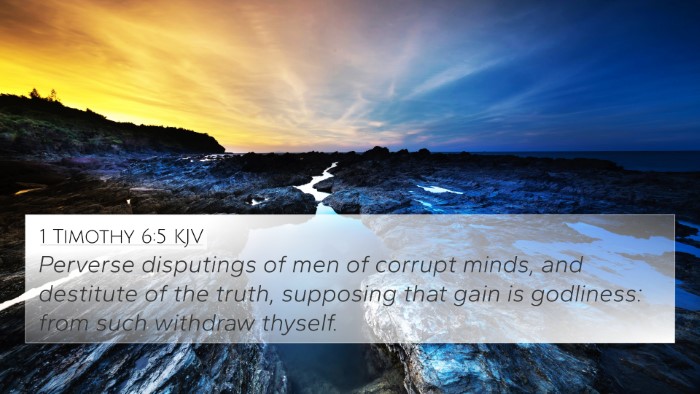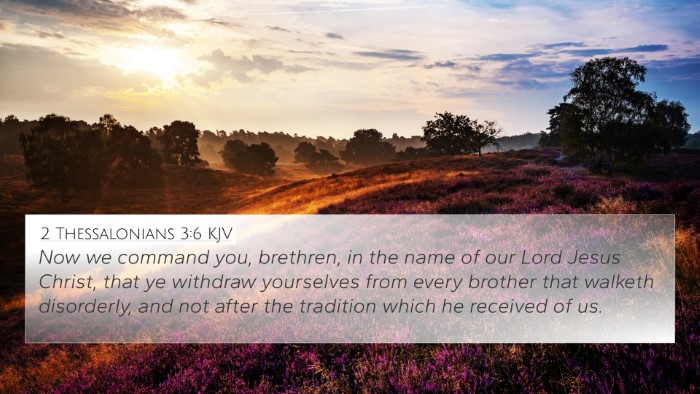Understanding Leviticus 13:46
Leviticus 13:46 states: "All the days wherein the plague shall be in him he shall be defiled; he is unclean: he shall dwell alone; without the camp shall his habitation be."
The verse emphasizes the isolation required for those afflicted with leprosy or similar diseases, which is a significant topic in the Law given to the Israelites.
Contextual Overview
This verse falls within a larger section of Leviticus that deals with laws regarding cleanliness and disease. The context indicates God's concern for the community's purity and health.
Insights from Commentaries
- Matthew Henry: Henry observes that this law served to protect the community, emphasizing that the infected individual must be separated. This condition illustrates the seriousness of sin and its defiling nature, akin to spiritual uncleanness.
- Albert Barnes: Barnes highlights that the regulations reflect God's holiness and the measures taken to maintain it within Israel. The affliction symbolizes not only physical illness but also the spiritual consequences of sin. The isolation underscores the need for repentance and purification.
- Adam Clarke: Clarke points out that the leprous person’s separation from the camp represents the broader biblical principle that sin creates barriers in our relationship with God and others. This serves as a precursor to understanding the New Testament's teaching on sin and grace.
Thematic Connections
Leviticus 13:46 can be linked to several key biblical themes, including:
- Purity and Holiness
- Sin and Consequences
- Community Health and Safety
- Isolation due to Defilement
- The necessity of cleansing and healing
Inter-Biblical Connections
This verse finds many connections in the Scriptures:
- Numbers 5:2-3: Discusses the separation of the unclean, reinforcing the community’s need to maintain purity.
- Matthew 8:1-4: Jesus interacts with a leper, demonstrating the culmination of the law's requirements in His healing and restoration of the afflicted.
- Luke 17:11-19: The story of the ten lepers emphasizes faith and the importance of acknowledging God’s work in their healing.
- Hebrews 13:13: Calls believers to go outside the camp, symbolizing suffering for the sake of Christ, paralleling themes of isolation and community in Leviticus.
- 2 Corinthians 6:17: Calls for believers to "come out from among them and be ye separate," echoing the sentiments of Levitical law.
- Revelation 21:27: Speaks of the New Jerusalem where nothing unclean can enter, furthering the themes of purity established in Leviticus.
- Matthew 23:25-28: Jesus condemns hypocrisy, indicating that external defilement is reflective of inner spiritual condition, resonating with the significance of cleanliness in Leviticus.
Practical Applications
Understanding Leviticus 13:46 provides crucial insights into the holiness of God and the importance of spiritual health:
- Spiritual Reflection: This verse encourages self-examination regarding personal sin and its impact on relationships.
- Community Responsibility: The isolation of the unclean individual serves as a reminder that collective purity is a communal responsibility.
- Recognizing Christ’s Work: In light of the New Testament, this verse helps to understand Christ’s healing and the new covenant that invites all to be cleansed.
Conclusion
Leviticus 13:46 presents profound lessons about the nature of sin, separation, and healing. The verse functions as an essential part of the Levitical law, teaching Israel about God's standards for holiness, while also foreshadowing the redemptive work of Jesus Christ, who came to heal and restore.
Cross-Referencing for Deeper Study
To further explore the themes in Leviticus 13:46, consider these cross-referencing Bible study methods:
- Using a Bible concordance to find related verses and concepts.
- Engaging in a comparative Bible verse analysis to understand parallels and themes.
- Exploring the thematic connections between Old and New Testament references related to purity and sin.
- Creating a cross-reference guide for deeper sermon preparation and theological reflection.
Recommended Resources
- Bible Cross-reference guides, which can help in linking Bible scriptures.
- Tools for Bible cross-referencing, particularly useful for navigating themes and connections.
- Bible reference resources focused on understanding the inter-Biblical dialogue.
- Comprehensive Bible cross-reference materials for effective study.



















